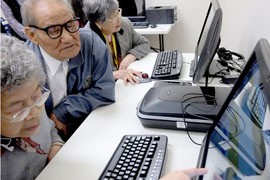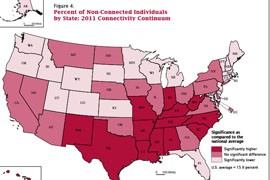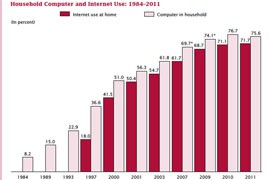Cronkite News has moved to a new home at cronkitenews.azpbs.org. Use this site to search archives from 2011 to May 2015. You can search the new site for current stories.
Inter-not: Report says three Arizonans in 10 have no Internet access
Editor’s Note: A previous version of this story misquoted Kathryn Zickuhr, an analyst from the Pew Research Center, by adding a statement that seniors turn to libraries for help with the Internet. Zickuhr did not say that. The story below has been updated to include her correct quote, in the sixth paragraph. Clients who used the story are asked to run the correction that can be found here.
WASHINGTON – Platforms for jobs, government and other services are increasingly moving online, but 30 percent of Americans do not have an Internet connection to access to those resources, a new Census Bureau report says.
The number in Arizona mirrored the nation, with just over 31 percent of state residents having no Net connectivity in 2011, the year profiled in the report.
“It may be surprising to some people, because a lot of people think everyone has a computer, everyone has Internet at home, everyone knows how, and that’s not true,” said Annette Vigil, manager of South Mountain Community Library in Phoenix.
The lack of access is particularly common for seniors, with about 54 percent of Americans 65 and older having no Internet access. That makes computers and computer classes at libraries and senior centers “really popular,” said Vigil, whose library offers free computer classes in English and Spanish every week.
South Mountain’s experience is not unusual, said Kathryn Zickuhr, an analyst from the Pew Research Center, which has reported on the digital divide.
“In focus groups, many librarians have talked about the issues that arise when seniors or other people who don’t use the Internet very much need to go online to access government forms that are now online-only,” Zickuhr said.
The Census survey described a “connectivity continuum” that ranged from people with no computer at home and no Net access up to those who have multiple devices with which to access the Internet.
Nationally, 15.9 percent of people had no home computer and another 14.4 percent had a computer but no Internet access in 2011, the report said. In Arizona, the numbers were 16.2 percent and 15.4 percent, respectively.
On the other end of the spectrum, 37.3 percent of Americans were “highly connected,” with access from home and elsewhere. In Arizona, 36.5 percent of residents fell in that category.
Men and women were about even in terms of access, while Asians and whites had higher levels of connectivity than blacks and Hispanics.
Greta Byrum, an analyst from the Open Technology Institute at New America Foundation, said it is essential that “people from all walks of life have access to the Internet and digital resources.”
“This should be a leading policy priority and a focus of investment,” Byrum said.
Vigil agreed that it is important for citizens to get online, which is “the way the world is now.”
“The world has changed from 10 years ago,” Vigil said. “You can’t apply for jobs any more, unless you know how to get on the Internet.”
That’s where libraries and other facilities come in.
“There are many people in our community, who don’t have computers at home and don’t know how to use them, so it’s very important that they have a place that they can come learn the basics and practice,” Vigil said.
At the city of Chandler’s Senior Center, classes teach people “how to move the mouse, how to type and everything,” said Loretta Colson. She said many of the seniors have never used the Internet before and don’t have anyone to learn from.
The Surprise Senior Center has been operating a computer lab and offering training classes for 10 years, said Leslie Rudders, a supervisor at the center. Classes are held six times a month on the basics of the computer and Internet.
“They want to learn, they realize it is the way of the future,” Rudders said. “To function in today’s modern world, everybody needs to have basic computer skills.”
And Rudders said senior citizens want to be able to email family members or stay in touch with friends, like everyone else.
“They want to send pictures, see pictures, email back and forth, which gives them nice context,” she said.
Rudders said seniors at her center are starting to buy tablets and smartphones, pushing the center to upgrade its service.
“Hopefully this coming year we are going to try to get wireless in here, so we can teach some of the newer devices as well,” she said.









